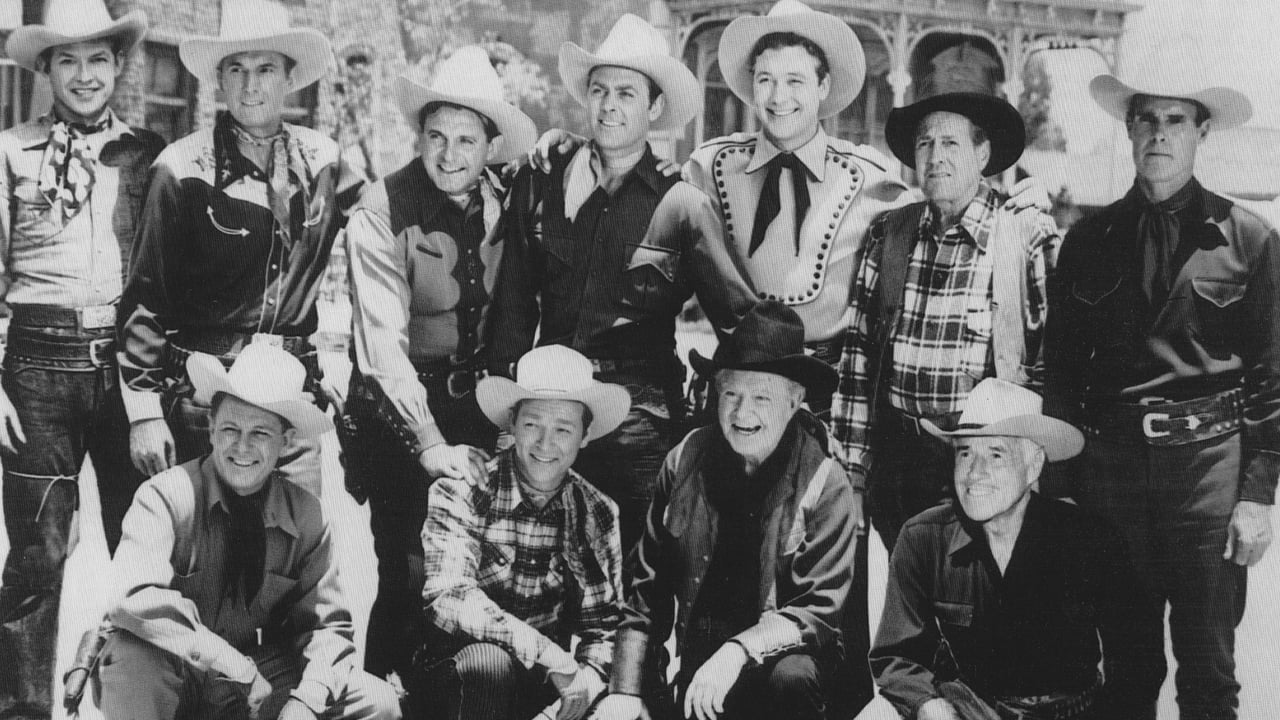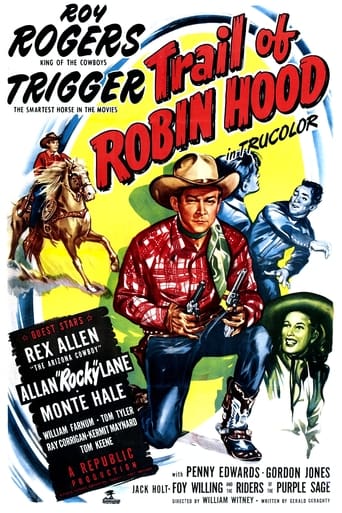Mike Newton
In one scene, Jack Holt is besieged by a bunch of youngsters who want his autograph. Holt chuckles and says that he was making movies long before any one of them were born. One girl answers, "We know, but we see them on television." At that, Holt chuckles and begins to sign autographs. Oddly enough, this film was shot at a time when even the word "television" was verboten. Rogers had not started his television series yet. The film's locale in a small western town makes it unlikely that any of these children would have a television set. Since Holt's westerns were mostly silent versions of Zane Grey stories, it is doubtful that they would have been shown on television. Cheryl Rogers, Roy and Dale's oldest girl (then age 9) is shown in the scene. The title "Trail of Robin Hood" may not make sense if you are looking for the character of Robin Hood. The idea of a Good Samaritan willing to make Christmas happier for poor children with a Christmas tree is expressed by Jack Holt (who is the Robin Hood figure). Also, Republic westerns were not to be taken seriously, They were pure entertainment designed to entertain kids on a Saturday afternoon. For a dime, you got two westerns, coming attractions, a comedy or cartoon, newsreel and of course a serial. About five hours of entertainment for a dime. You can't get that kind of a bargain anymore.
bkoganbing
The title of this film is completely misleading. Ain't nobody robbing from the poor to give to the rich in this Roy Rogers western. Instead Roy plays a U.S. Forestry Inspector (they never say Forest Ranger because Roy is not in the regulation Smoky the Bear outfit)who is guarding the evergreen forests and preventing those who want to cut those trees down before its time at Christmas season.Oldtime movie star Jack Holt plays himself and he's got a lot of evergreens on his land which adjoins the big spread of tycoon Emory Parnell. Parnell wants to corner the Christmas tree market while Holt wants to give his trees away almost at cost and probably get a nice tax write-off thought that isn't mentioned. Parnell has a daughter, Penny Edwards, who goes down to look after Dad's interests, but when Roy sings a few songs, she melts.Parnell goes down himself and finds his foreman Clifton Young working a whole racket unto himself to cheat both Holt and Parnell. You might remember Young as the skel who tries to blackmail Humphrey Bogart in Dark Passage. He's just as much a skunk in Trail of Robin Hood. He died tragically however the following year in a hotel fire, the same year as Jack Holt.Gordon Jones, later Mike the Cop on the Abbott and Costello show, did a few films with Roy as an amiable oaf of a sidekick named Splinters at this time. He has a little sister in this film, Carol Nugent, who is quite the tomboy and constantly showing Jones up. It turns out Roy needs a lot of help in this film and he gets it from a whole flock of cowboy heroes of several generations. Herbert J. Yates of Republic got Monte Hale, Rex Allen, Rocky Lane, and Ray Corrigan who were all with his studio and a few from past generations like Kermit Maynard, Tom Keene, Tom Tyler, and William Farnum all pitched in to help old friend Holt rout the bag guys.I kind of liked seeing all these guys on the screen together as wildly improbable though it was. Then again it was B western from Republic so it can only go one way.We've seen many a racket operate in the west, but cornering the Christmas Tree trade. How low can you sink?
bsmith5552
"Trail of Robin Hood" it should be said, has absolutely nothing to do with Robin Hood. It is though, one of my favorites Rogers westerns. Directed by William Whitney, it's filled with action, hard ridin', sweet singin' and cameos from several western stars which Republic liked to do from time to time. The story is about Roy coming to the aid of retired cowboy star Jack Holt (playing himself) who is competing with a large company to market Christmas trees. The company headed by Aldrich (Emory Parnell) is trying to buy up the rights to cut the trees from local ranchers. Of course Holt won't sign up. Aldrich's foreman Mitch McCall (Clifton Young) and his henchmen including Murtagh (James Magill) and Whitey (Lane Bradford) do all they can to foil Holt and Rogers efforts. Aldrich's daughter Toby (Penny Edwards) goes to the camp to try to persuade Holt to sell his trees. But of course she comes over to Roy and Jack in the end. Splinter (Gordon Jones) and his kid sister "Sis" along with a turkey named "Galahad" and Foy Willing and the Riders of the Purple Sage are also along to help. When McCall frightens the men who were to drive Holt's wagons in the race to market, Sis calls in several cowboy heroes to help. The stars of Republic's other "B" western series, Rex Allen, Allan "Rocky" Lane and Monte Hale lead the charge. Also pitching in are former cowboy heroes Ray "Crash" Corrigan, Tom Keene, Tom Tyler, Kermit Maynard, William Farnum and reformed bad guy George Cheseboro. Farnum and Holt's careers dated all the way back to the early days of silents. Needless to say the good guys prevail and the picture ends with Roy and Trigger riding off into the sunset amid a snow storm. Dale Evans, Roy's leading lady both on and off the screen was off having a baby when this picture was made. "Trail of Robin Hood" released in 1950 proved to be Roy Rogers last Trucolor western. The remaining entries in his series, which ended in 1951, would all be in Black and White.
Brian Camp
TRAIL OF ROBIN HOOD (1950) is a late Trucolor Roy Rogers western directed by Republic Pictures' great action director, William Witney. While the plot is somewhat absurd, the film boasts a number of novel touches. First off, it features great outdoors Trucolor photography, giving it a look that only Roy Rogers westerns of 1947-50 seemed to have. Second, former action star Jack Holt is on hand playing himself as a retired western star who harvests Christmas trees on his ranch. Third, it offers a host of second- and third-tier cowboy stars, some retired, as guest stars who come to Jack's aid. Fourth, it features cute little Carol Nugent as a pre-adolescent sharpshooter. Fifth, it gives Dale Evans a break and hands female lead duties over to pretty Penny Edwards, a perennial western fan favorite.Rogers plays Roy Rogers, head of the local office of the U.S. Soil Administration(!). When a rival timber crew crosses the land boundary and cuts down Christmas trees on Jack Holt's property, Roy enters the scene riding Trigger and carrying twin six-shooters. The rival crew is upset at Holt's plan to sell the trees at cost so that poor families can buy them. Apparently, the Christmas tree market in rural Southern California is so lucrative that villain Mitch McCall (Clifton Young) is even willing to commit arson and murder for a piece of it. Aldridge (Emory Parnell), McCall's unwitting employer, sends his daughter, no-nonsense businesswoman Toby (Penny Edwards) to check up on things. She seems to be in cahoots with McCall for much of the film, but then falls under Roy's musical spell (aided by Foy Willing and the Riders of the Purple Sage) and--presto!--becomes a homebody, cooking Christmas dinner for everybody.When McCall's henchmen make it tough for Holt to get his trees to market, young Sis McGonigle (Carol Nugent) sends out a call for help to nine of Holt's movie star buddies, including Allan 'Rocky' Lane, Monte Hale, Rex Allen, William Farnum, Tom Keene (later to appear in the equally subtle PLAN NINE FROM OUTER SPACE) and Tom Tyler (yes, Captain Marvel himself). They all show up on horseback in full western regalia, but all they actually get to do is drive wagons on a studio rig against a rear screen projection background.Although this is set at the time it was filmed, 1950, it occupies an alternate Hollywood universe that was unique to B-westerns. Roy is a government officer and Mitch McCall is a company man, yet they both wear cowboy outfits, complete with gun belts, and, like most of the locals, ride horses. The main town is a standard-issue western set (not a paved road, gas station, diner, or drugstore in sight, and no cops either, except for a lone sheriff). Only one character, Toby, the city girl, rides a car (a roomy 1950 convertible). When Holt tells the kids about his old movies, they tell him they have television. (Yet, we don't see any antennas! Hmmm...) When the cowboy stars drive the Christmas trees to market, they use wagons, not pickup trucks. This was not unusual in B-westerns with contemporary settings, but the effect is triply bizarre when viewed in Trucolor.Trucolor was a two-strip color process (as opposed to Technicolor's three-strip process), that tended to favor blue, orange and brown hues. Red usually wavered toward orange, yellow was never visible and green was only rarely glimpsed, making Trucolor an odd choice for a film in which hundreds of Christmas trees (colored a parched brown in this print) play an important role.Roy is his usual two-fisted, righteous self, plunging into fights with the Christmas tree grabbers even when the odds are against him, in true Republic Pictures fashion. He rides Trigger at great speeds, but is ably assisted on the action front by his German shepherd, Bullet, who bares his fangs and sinks them into a steady stream of Roy's adversaries. Jack Holt is quite charming here, somewhat looser and more relaxed than when he had to play the square-jawed hero. He had started in movies in 1914 and became a top silent star of adventures and dramas in the 1920s and continued as a star, but in lower-budgeted films, well into the sound era. He had two more films in the can after this one, which was released a month before he died of a heart attack at 72.Gordon Jones (Mike the cop on the old Abbott & Costello TV show) provides comic relief as the town handyman and buffoon, Splinters McGonigle, who gets out of numerous jams thanks to his resourceful little sister, Sis. Clifton Young is a convincingly slimy-looking villain (the actor died a year later). The Lydecker Brothers, Republic's famous special effects team, contribute a sequence showing the burning of the Red River Bridge. There are three or four forgettable songs, one with a Christmas theme. The title, TRAIL OF ROBIN HOOD, is somewhat puzzling, unless Holt's act of selling his own Christmas trees at cost to needy families is seen as a Robin Hood-like act (stealing from yourself to sell to the poor?). This one pales in comparison to other Rogers Trucolor westerns, most notably THE GOLDEN STALLION (1949) and TRIGGER, JR. (1950), but it's still a must-see for Rogers fans or anyone seeking a visually striking, offbeat, action-packed western.


